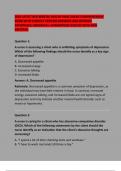Exam (elaborations)
2024 LATEST HESI MENTAL HEALTH FINAL EXAM: COMPREHENSIVE EXAM WITH CORRECT VERIFIED ANSWERS AND DETAILED RATIONALES. GRADED A+. GUARANTEED SUCCESS WITH NGN MATERIAL Successus
- Course
- Institution
2024 LATEST HESI MENTAL HEALTH FINAL EXAM: COMPREHENSIVE EXAM WITH CORRECT VERIFIED ANSWERS AND DETAILED RATIONALES. GRADED A+. GUARANTEED SUCCESS WITH NGN MATERIAL
[Show more]



